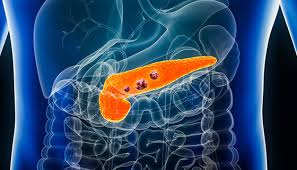- +91 8465889900
- dr.prashanth.gastro@gmail.com
- Dr Prashanth Gastro Clinics, Vanasthalipuram, Hyderabad

Pancreas is 6 inches long having a thin pear lying on its side in between the stomach and spine. Pancreas plays a major role in the digestive system producing enzymes and hormones that aid in digestion and regulate blood sugar levels. Pancreatic diseases are conditions that affect the function or structure of the pancreas.
There might be possibilities of different kinds of pancreatic disorders if you are suffering from pancreatic pain. Some are not major and can be treated with medication at the right time while some major diseases may require surgery. The different types of pancreatic diseases are mentioned below:
Pancreatitis: This is a kind of pancreatic disorder that is developed due to the inflammation of the pancreas, which can be acute or chronic. Acute pancreatitis is a sudden inflammation that typically resolves within a few days, while chronic pancreatitis is a long-lasting inflammation that can lead to permanent damage to the pancreas.
Pancreatic cancer: This is a malignant tumor that arises in the pancreas. It can be difficult to diagnose and is often detected at a late stage when treatment options are limited.
Diabetes: The pancreas produces insulin, a hormone that helps regulate blood sugar levels. Diabetes is a condition in which the body cannot produce enough insulin or cannot use it properly, leading to high blood sugar levels.
Cystic fibrosis: This genetic disorder affects the production of mucus, leading to blockages in the pancreas and other organs.
Pancreatic pseudocyst: This is a fluid-filled sac that develops in the pancreas after an episode of pancreatitis.
Pancreatic ductal abnormalities: These are structural abnormalities in the pancreatic ducts that can cause problems with the flow of pancreatic juices, leading to inflammation and other complications.
Pancreatic insufficiency: This is a condition in which the pancreas cannot produce enough enzymes to properly digest food, leading to malabsorption and malnutrition.
Familial Chylomicronemia Syndrome (FCS): FCS is a rare genetic disorder that affects how the body processes fats, leading to extremely high levels of triglycerides in the blood ultimately triggering pancreatic function.
Autoimmune Pancreatitis (AIP): AIP is a type of chronic pancreatitis that is caused by an abnormal immune response, in which the immune system mistakenly attacks the pancreas. AIP can occur in isolation or may be associated with other autoimmune conditions, such as primary sclerosing cholangitis or inflammatory bowel disease.
The pancreatic disease can present with a range of symptoms depending on the type and severity of the condition. Some common symptoms of the pancreatic disease include:
Pancreatic diseases can potentially lead to pancreatic cancer, but not all cases of the pancreatic disease will progress to cancer. It is important to understand that pancreatic cancer can develop in individuals without any prior history of pancreatic disease as well.
Long-standing inflammation can cause damage to the cells of the pancreas, which can lead to the development of abnormal cells and eventually, cancer.
There are several tests that can be done to diagnose pancreatic cancer. The specific tests used may depend on the patient’s symptoms and medical history. Some of the common tests used for diagnosing pancreatic cancer include:
Pancreatic disease treatments depend on the specific conditions and their severity. Here are some common pancreatic disease treatments in Hyderabad:
For acute pancreatitis: Treatment for acute pancreatitis often involves hospitalization, fasting, and intravenous fluids to rest the pancreas. The doctor may prescribe pain medication in initial cases, and in severe cases, surgery may be necessary to remove damaged tissue or repair any complications.
For chronic pancreatitis: Treatment for chronic pancreatitis may involve lifestyle modifications such as quitting smoking, reducing alcohol consumption, and following a low-fat diet. Pain medication and pancreatic enzyme supplements may also be prescribed, and in some cases, surgery may be necessary to relieve blockages or remove damaged tissue.
For pancreatic cysts: Treatment for pancreatic cysts depends on the type and size of the cyst. Small cysts may be monitored for changes over time, but for larger cysts, surgery is required so that we can save cysts to cause any complications. Dr. Boddula Prashanth is a surgeon having over 22 years of surgery experience and you can consult at any instance as soon as you feel any symptoms or are diagnosed with any pancreatic cysts.
For pancreatic cancer: Pancreatic cancer treatment depends on the stage and location of the cancer. Treatment may involve surgery to remove the tumor, chemotherapy, radiation therapy, or a combination of these treatments.
For autoimmune pancreatitis: Treatment for autoimmune pancreatitis may involve corticosteroids to reduce inflammation, as well as immunosuppressive drugs to help prevent the immune system from attacking the pancreas.
For familial chylomicronemia syndrome (FCS): Treatment for FCS may involve a low-fat diet, lifestyle modifications, and medication to reduce triglyceride levels.
If you are reading this, you might be struggling with pancreas disease and looking for the best pancreas disease treatment in Hyderabad. Your search will end here with the best pancreatic disease treatment provider Dr. Boddula Prashanth . There might be chances that you are on the verge of seeking pancreatic cancer treatment and looking for the best treatment possible. Connect with Dr. Boddula Prashanth at +91 8465889900 and explore the best treatment option available for you.